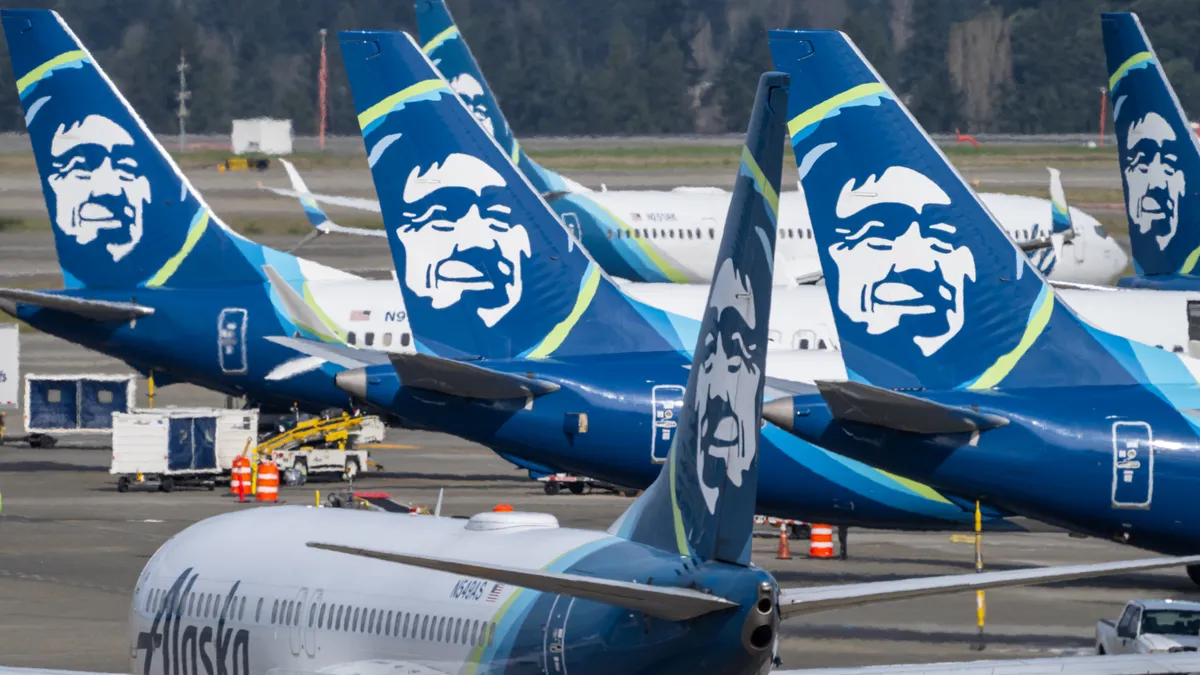Dive Brief:
- The Department of Justice won’t contest Alaska Air Group’s purchase of Hawaiian Airlines after the Hart-Scott-Rodino review period ended Monday without government comment.
- The deal still requires approval from the Department of Transportation. But the Justice antitrust review was considered the most onerous hurdle for the proposal, especially after the DOJ blocked JetBlue Airways’ purchase of Spirit Airlines, and the regional business alliance American Airlines and JetBlue forged at multiple airports.
- The deal, announced in December, includes $1 billion for Hawaiian and the assumption of $900 million of debt. Hawaiian will operate under its existing brand, although the company will become part of Alaska Air.
Dive Insight:
Alaska, the fifth-largest U.S. airline, had argued that the merger would create a far stronger competitor to the nation’s four behemoth carriers, which command more than three-quarters of U.S. air traffic.
Alaska and Hawaiian have little overlap on existing markets beyond California-Hawaii routes, and the latter airline has scant service on the U.S. mainland.
The airlines had also made the case that their merger would also bolster competition by allowing more seamless travel to and from Hawaii. Many of Hawaiian’s customers in its home state must now buy tickets on different carriers if they want to fly beyond the U.S. West Coast, for example on a trip from Honolulu to Columbus, Ohio.
“Even the naysayers of all airline industry consolidation that have the upper hand at the Justice Department right now couldn’t really find fault with this deal,” said Howard Kass, former vice president of legal and government affairs at US Airways and a former American Airlines government affairs executive.
If completed, Hawaiian’s merger into Seattle-based Alaska would be the first large U.S. airline deal regulators have approved since 2016, when Alaska acquired Virgin America for $2.6 billion and debt.
Hawaiian’s sale differs from the two recent deals involving JetBlue in several ways, Kass told Legal Dive Tuesday.
A federal judge ruled in January that allowing JetBlue to acquire Spirit would eliminate a unique competitor that offered low-cost fares, providing air travel for many people who would otherwise be unable to fly.
With the so-called Northeast Alliance that American and JetBlue had pursued — coordinating their schedules in Boston and New York — the arrangement allowed American to become even larger. The Justice Department and six states sued to block the alliance and in May 2023, a federal court found that the airlines’ collusion was anti-competitive and ordered them to dismantle the agreement.
“In each of those cases the government was able to demonstrate to the courts discernible harm to consumers,” Kass said, and those arguments in the court decisions “overwhelmed any of the benefits that the defendants put forward.”
Government antitrust lawyers likely did not conclude that Hawaiian was the same kind of competitor as Spirit or that they couldn’t prove their case in court, said Rebecca Haw Allensworth, a professor of antitrust law at Vanderbilt Law School.
“Their position was that Spirit was a very disruptive competitor,” she said. “Spirit would come into a market and when it did, all the airlines including JetBlue would have to lower their prices.”
“We can infer that the DOJ did not view Alaska or Hawaiian as that kind of disruptive competitor or they felt like they couldn’t prove it,” Allensworth said. “The failure to challenge a merger is not the same as a blessing of the merger.”
The airlines’ unions and Hawaii’s governor supported the deal, given Alaska’s promises to keep jobs and to maintain a robust schedule of flying in the state. “They really did a good job of lining up the politics here,” Kass said. “There was no one opposed to this deal as far as I can tell.”
Shares of Hawaiian Holdings, the airline’s parent, rose 11.3% Tuesday on news of the DOJ decision.











